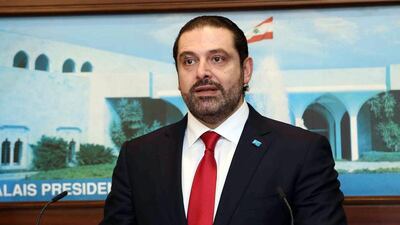Saad Hariri took Lebanon by storm over the weekend, when he announced his resignation as head of the government. He blamed his decision on Iranian interference in his country's affairs.
Mr Hariri issued a strong condemnation of Iran and its Lebanese ally, Hizbollah, the Shiite militia and political party that is part of the 30-member national unity cabinet he previously led. Lebanon is governed by a sectarian political system, divided between a coalition aligned with Shiite Hizbollah and Iran, and another siding with Saudi Arabia, and other Arab and western countries. Since last year, Lebanon's rival blocs have essentially agreed to put their differences aside and join forces in a unity government. Hizbollah, which fought until 2000 the Israeli occupation of south Lebanon, is currently the strongest Lebanese faction because of its powerful militia and has served since 2013 as an Iran's expeditionary force in Syria.
“Wherever Iran settles, it sows discord, devastation and destruction, proven by its interference in the internal affairs of Arab countries,” MrHariri said, adding that Iran’s “hands” in the region “will be cut off”.
_________________
Read more from Mona Alami
Hizbollah’s evil hand continues to stir Syria’s war
In Lebanon, ISIL’s deadly siren call remains strong
Strategic changes help Assad cling on to power
_________________
The resignation will likely have several significant impacts for Lebanon. First, it will plunge Lebanon into political uncertainty. Second, the escalation between Saudi Arabia and Iran on Lebanese soil may target Lebanon's vulnerabilities: its economy, which could have devastating repercussions on the country's various religious and social communities, depending on how strong of a push Saudi may attempt and whether it will have US backing in the process.
Mr Hariri's resignation will deny Hizbollah the coverage of a credible Sunni governing partner and bring down the label of a unity government under the presidency of Michel Aoun, a political ally of Hizbollah. Mr Hariri has failed to stop Hizbollah from fighting in Syria, making multiple threats against Saudi Arabia, nor has he pushed the government to appoint a new Lebanese ambassador to Damascus.
Mr Hariri’s resignation will throw the country in another political vacuum, one that may be prolonged by the hesitancy of Sunni political heavyweights to form a new government. Parliamentary elections scheduled for next May will also be postponed.
If Mr Aoun and Hizbollah decide to form a government that excludes major Sunni factions, the new cabinet could expose Lebanon to devastating sanctions.
Saudi state minister for Gulf Affairs Thamer Al Sabhan declared on Monday that Lebanon “will not be the same after the resignation” of Mr Hariri adding that “it is in the hands of its leaders to either be a state of terrorism or peace".
_________________
Read more from Opinion
Why the education sector could learn a lot from Netflix
Trump in the White House: will the great disrupter unsettle America's checks and balances?
How innovation makes public services immune to disruption
_________________
A prominent Lebanese economist speaking on condition of anonymity believed that Saudi Arabia could decide on a series of measures, such as preventing Saudi banks from dealing with the Lebanese financial sector, stopping issuing visas for Lebanese businessmen and if they are residents ask them to leave the country. In 2009, there were over 350,000 Lebanese residing in the Gulf. “The first impact will be on confidence, then on trade and banking,” underlined the economist.
Other sources close to Riyadh power circles argue that the possible escalation of sanctions could be circumvented by factions close to Hizbollah, namely members of Mr Aoun’s Free Patriotic Movement or to speaker of the house Nabih Berry's Amal movement.
The Trump administration has also been ramping up efforts against Hizbollah, which the US has listed as a "terrorist" group since the 1990s. Mr Trump has spoken out against Iran and the nuclear deal and the US Congress approved additional sanctions on Hizbollah and foreign states that support it. According to Hizbollah expert, Nicholas Blanford, these sanctions can be further tightened. He said there had been talks in Washington to use the Patriot Act to designate certain regions of Lebanon as "money laundering concern", a measure that if adopted would further increase pressure on the Lebanese economy and banking system.
In a surprisingly toned down televised appearance, Hizbollah's secretary general Hassan Nasrallah urged calm, alleging that Mr Hariri's resignation had been imposed by Saudi. While Hizbollah may be for now at least, impervious to Saudi and US threats, thanks to its military strength and the relentless Iranian back up, Lebanon is left in an extremely vulnerable position.
Breaking the back of Hizbollah will require throwing Lebanon economically and socially spiraling out of control, an endeavor that ultimately hinges on how far Riyadh is willing to go and how much leverage it will have from Washington and the international community.
Mona Alami is a non-resident fellow at the Rafik Hariri Centre for the Middle East

